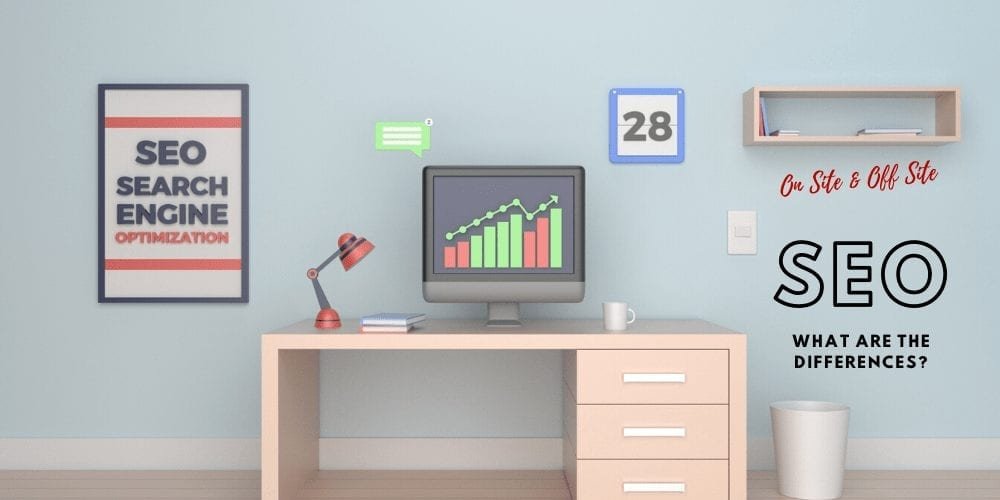
In order to run a successful online business, getting your website in front of as many people as possible is crucial. This is where SEO (search engine optimization) comes in.
For beginners, understanding the use of keywords is quite simple. But other aspects of SEO might not be as easy to understand. For example, what is the difference betweeen on-site and off-site SEO?
On-Site SEO and Off-Site SEO

On-Site SEO is pretty self-explanatory. It’s what you do on your website to drive traffic. Off-Site SEO is what you do outside of your website to drive traffic.
What Is On-Site SEO
#1. Keyword Research: This is essential for an online business to find relevant keywords that have search traffic and low competition. A keyword research tool like Jaaxy is highly recommended for its effectiveness and simplicity.
#2. URL Analysis: Ensuring that your website URL is user and search engine friendly. Basically, your URL needs to indicate what your web page is about.
#3. Meta Tags: These are data such as Descriptions, H1 Tags, Keywords, etc that helps search engines recognize the relevance of your website or web pages.
#4. Site Functionality: Is your website accessible to visitors and search engines? Is it easy to navigate?
#5. Rich Site Summary (RSS): The web feed format that regularly updates the news, blogs, etc.
#6. Content Analysis: Your content is analyzed to check for relevance and appropriateness to determine it’s ranking in the search engines. (Without Content, you won’t have anything for search engines to index).
#7. 301/404 Page Redirect: When your website contains broken links, it can cause visitor inconvenience. This can happen when you change the URL to a web page. You can use 301/404 page redirect to redirect your visitors to the appropriate page.
#8. Internal and External Links: When other people link to your website, it shows the importance of your content and promotes more traffic (External). When you provide your visitors with links that are still a part of your website it is considered (Internal).
#9. HTML Code Optimization: This makes transferring pieces of codes more efficiently on your website. In today’s age of website building, most themes are optimized in this aspect for SEO.
What Is Off-Site SEO
#1. Guest Blogging: Similar to writing on your own, guest blogging can be very beneficial to your website. However, it is important to understand that if the blog is not great in quality and not relevant to your niche audience, it can be a waste of time and effort.
If you allow guest blogging, I would evaluate every single one before publishing to the public.
#2. Social Media Marketing: You should create social media accounts for Facebook, Google Plus, Pinterest, Twitter, Tumblr, etc. You can drive a ton of traffic by creating a social media presence for our audience.
These are the following benefits of how social media can help you:
- You can promote your website (Free Advertisement)
- It allows your visitors to share your website (Free Advertisement)
- You can build your website’s online reputation.
- You can network with people who are interested in your niche.
- Allows you to communicate with your visitors.
Don’t have your business social media accounts yet? Go make them now!
#3. Social Bookmarking: There are online services that allow users to add, annotate, edit, and share bookmarks of web pages like your website. Once your website is bookmarked, the chance of visitors returning to your website increases exponentially.
With Social bookmarking, you can submit your latest content t drive more traffic, but make sure the content you submit is actually helpful.
#4. Link Building (Quality > Quantity): This comes naturally as you build more authority with your website. The idea is NOT to get a ton of links back to your website. It’s to get QUALITY links back to your website from websites with authority.
When you get a few quality websites to link back to your website, it can make a huge difference compared to getting a lot of links to random websites with no reputation.
When your website is linked by another with authority, it lets the search engines know that people are finding the content on your website to be helpful and trustworthy.
Note: If you want to have quality links to your website, you should first focus on your content. If your content is not linked worthy, no matter what you do, you won’t see any real results.
In Conclusion
If you want to maximize your website’s traffic, you should focus on BOTH On-Site and Off-Site SEO (Consider them both as your left and right arm).
You can probably do well with focusing on one, but you will do even better if you focus on both(:
As a beginner, I would focus on On-Site SEO first because it will be the foundation of your website. Once your website is more developed with helpful and engaging content, then you should focus on Off-Site SEO as well. Does that mean On-Site is better than Off-Site?
Absolutely not! You should need to have content to be able to work on the Off-Site portion.
Anyways, thanks for reading! Hopefully, this article was helpful to you. If you have any comments, questions, or suggestions, please let me know by leaving a comment below!
You can also do me a huge favor by sharing this article with your folks via Social Media.


 Protected by Patchstack
Protected by Patchstack